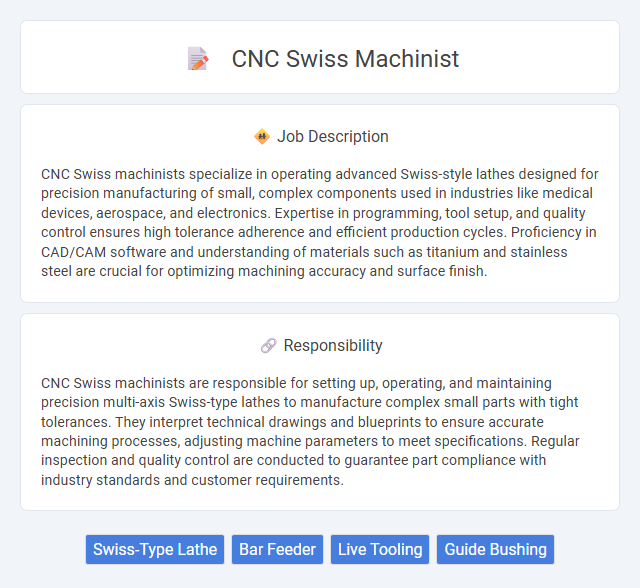
CNC Swiss machinists specialize in operating advanced Swiss-style lathes designed for precision manufacturing of small, complex components used in industries like medical devices, aerospace, and electronics. Expertise in programming, tool setup, and quality control ensures high tolerance adherence and efficient production cycles. Proficiency in CAD/CAM software and understanding of materials such as titanium and stainless steel are crucial for optimizing machining accuracy and surface finish.
CNC Swiss machinist roles may suit individuals who demonstrate strong attention to detail and possess patience for repetitive precision tasks, likely thriving in environments requiring meticulous focus. Those with mechanical aptitude and good hand-eye coordination probably find this job rewarding, although it may not suit people preferring dynamic or less technical work settings. The role often demands physical stamina and the ability to troubleshoot complex machinery, which could be challenging for individuals uncomfortable with technical problem-solving or physical labor.
Qualification
A CNC Swiss machinist must possess advanced skills in operating Swiss-type turning centers with precision and efficiency, often requiring certifications in CNC programming and tooling. Proficiency in computer-aided manufacturing (CAM) software and a deep understanding of metallurgy and machining processes are essential qualifications. Experience in interpreting complex blueprints and adherence to tight tolerances are critical to ensuring high-quality production in aerospace, medical, and electronics industries.
Responsibility
CNC Swiss machinists are responsible for setting up, operating, and maintaining precision multi-axis Swiss-type lathes to manufacture complex small parts with tight tolerances. They interpret technical drawings and blueprints to ensure accurate machining processes, adjusting machine parameters to meet specifications. Regular inspection and quality control are conducted to guarantee part compliance with industry standards and customer requirements.
Benefit
CNC Swiss machinist positions probably offer competitive salaries and comprehensive benefits packages, such as health insurance and retirement plans. Job stability and opportunities for skill development through advanced training programs may also be likely. Workers might benefit from a collaborative work environment that emphasizes precision and efficiency.
Challenge
The CNC Swiss machinist job likely presents significant challenges in maintaining precision and consistency when working with extremely small and complex components. Operators probably face the probability of tight tolerances and intricate programming demands that require advanced technical skills and meticulous attention to detail. The role may also involve troubleshooting unexpected machining issues to ensure high-quality production outcomes.
Career Advancement
CNC Swiss machinists gain expertise in precision engineering by operating advanced multi-axis Swiss-type lathes, essential for producing intricate, high-tolerance components in industries such as aerospace, medical, and electronics. Mastery in programming, tool setup, and quality control enables machinists to progress into senior operator roles, CNC programming specialists, or production supervisors. Continuous skill development and certification in CNC technologies often lead to higher salaries and opportunities in automation integration and manufacturing management.
Key Terms
Swiss-Type Lathe
A CNC Swiss machinist specializes in operating Swiss-Type Lathes, which are precision machines used for producing intricate, small-diameter components with tight tolerances. Mastery of G-code programming and tool setup is essential for optimizing cycle times and ensuring high-quality finishes on materials such as stainless steel, brass, and titanium. Expertise in multitasking capabilities of Swiss-Type Lathes allows machinists to perform drilling, milling, and turning operations simultaneously, enhancing productivity in sectors like medical device manufacturing and aerospace.
Bar Feeder
A CNC Swiss machinist specializing in bar feeder operations expertly manages precision machining of small, complex components using CNC Swiss turning centers equipped with automated bar feeders. Mastery of bar feeder setup, feeding mechanisms, and troubleshooting ensures continuous material supply for high-volume production, enhancing efficiency and reducing downtime. Proficiency in interpreting engineering blueprints and programming CNC Swiss machines optimizes machining accuracy and productivity in industries such as aerospace, medical devices, and electronics.
Live Tooling
CNC Swiss machinists specialize in operating Swiss-style CNC lathes equipped with live tooling, allowing simultaneous milling, drilling, and turning operations on complex, small-diameter precision parts. Live tooling enhances productivity by enabling multi-axis machining within a single setup, reducing cycle times and improving part accuracy for industries like medical, aerospace, and electronics. Expertise in programming and maintaining live tooling systems is critical to achieving tight tolerances and high-quality finished components.
Guide Bushing
A CNC Swiss machinist specializing in guide bushing ensures precise alignment and support of the cutting tool, enabling highly accurate and consistent production of intricate parts. Mastery of guide bushing setup, maintenance, and troubleshooting is critical for minimizing tool runout and maximizing machining efficiency in Swiss-type CNC lathes. Expertise in this area directly impacts product quality, reducing waste and improving cycle times for industries such as medical device manufacturing and aerospace.
 kuljobs.com
kuljobs.com